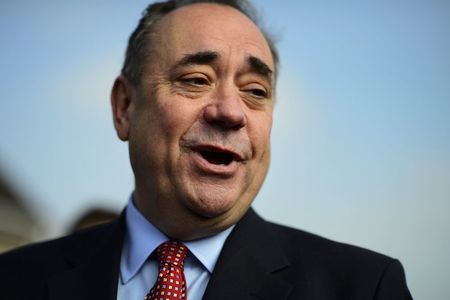LONDON (Reuters) - Scottish nationalist leader Alex Salmond demanded an investigation into what he said was an attempt by Britain's government to scare voters out of backing independence next week and which, he said, broke financial market rules.
With polls showing Scots split almost 50-50 on whether to break away from the United Kingdom, Salmond said he wanted to know how media organisations found out about plans by Royal Bank of Scotland (L:RBS) to move its registered office to England if the independence campaign wins a referendum next Thursday.
The news about RBS, which broke late on Wednesday, was seen as a blow to the independence campaign although the bank has said it will not move jobs from Scotland to England.
The head of Britain's civil service, Jeremy Heywood, responded on Thursday to an initial complaint by Salmond, saying the finance ministry had confirmed to media that RBS had contingency plans to move its registered office out of Scotland.
But the information was released only after it had already been reported by a newspaper and the BBC, and there was no breach of the government's internal rules, Heywood said.
Salmond refused to accept the explanation.
"That is an extraordinary development which merits an urgent and thorough investigation, given that it appears to be a clear and serious breach of both financial market rules and pre-referendum guidelines," he said in a letter to Heywood on Friday, excerpts of which were distributed to the media.
A spokesman for Britain's finance ministry said he was unable to respond immediately on Salmond's comments.
RBS is about 80 percent owned by the British government which rescued the bank during the financial crisis.
Salmond also accused British Prime Minister David Cameron of spearheading a last-ditch campaign to get business leaders to warn that there were dangers linked to independence.
The Financial Times reported on Friday that Cameron urged business leaders at a Downing Street reception on Monday to speak out against independence.
On Wednesday and Thursday, executives from several major companies including oil majors BP and Shell made statements about how uncertainty surrounding a break-up of Britain could affect them. Retailers including John Lewis said a split might push up prices north of the border.
A spokesman for Cameron said the prime minister wanted people to set out their positions but it was entirely their own decision whether to speak out.

"The approach that the prime minister and others have taken is ... about saying to everyone in the UK, across the UK, if you have views with regard to this that could inform he debate then people should feel free to express them," the spokesman said.
(Writing by William Schomberg; Additional reporting by Kylie Maclellan; Editing by Andrew Heavens)
